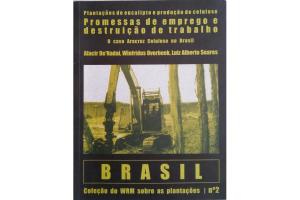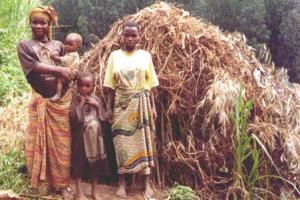In 1979, when occupying one of the last remaining forest areas of the Mata Atlântica (Atlantic Rainforest), not yet cut by the former Aracruz Florestal --currently Aracruz Celulose-- the Tupinikim and Guarani indigenous peoples in the State of Espírito Santo started a long struggle to get their lands back. This struggle was interrupted in 1998, when Tupinikim and Guarani indigenous communities, isolated and under great pressure, had to sign an agreement with Aracruz Celulose.
Brazil
Bulletin articles
20 May 2005
Publications
18 May 2005
This paper presents and analyzes data about employment and work in eucalyptus plantations and cellulose production for export in the state of Espírito Santo, more specifically about the company Aracruz Celulose, leader of the sector in Brazil.
Bulletin articles
21 March 2005
The world's largest producer of bleached eucalyptus pulp has plans to become even bigger. Last year, Aracruz Cellulose produced 2.5 million tons of pulp. The company is looking at five possible sites to build a new, one million tons a year pulp mill. Over the next two years, Aracruz will spend US$600 million on upgrading its existing pulp mills and expanding its 305,000 hectare plantation area.
Other information
21 March 2005
For the second time, the Clean Development Mechanism's (CDM) Executive Board has rejected the reasons of Vallourec & Mannesmann do Brasil for requesting carbon credit money for industrial tree plantations.
Bulletin articles
22 February 2005
The World Social Forum is not a space for dreaming, but a place for sharing ideas on how to make a common aspiration come true. The message is clear: another world IS possible. What world? A world where social justice prevails, where peace is a reality, where nature is respected, where people interact as equals.
Bulletin articles
22 February 2005
A number of participants at the World Social Forum 2004 met in Mumbai and believing that forest issues are in essence social and political and that forest communities are increasingly affected by globalization --and new forms of trade and economic liberalization that comes in its way-- agreed on the need to create a global movement to ensure forest conservation and peoples' rights over forests. The principles on which the movement would be based were agreed upon and circulated by the groups as the Mumbai Forest Initiative - Statement of Principles.
Other information
22 February 2005
In 1972 the Norwegian group Borregaard set up a pulp mill in the State of Rio Grande do Sul, a few kilometres away from the City of Porto Alegre, (municipality of Guaiba), on the banks of the river Guaiba. This mill was to close down in 1975 as a result of public pressure against the contamination it was causing. That same year it was purchased by the Klabin Company, and reopened under the name of Riocell.
Bulletin articles
22 February 2005
In an increasingly fragmented and specialized world, very often social and resistance responses are inevitably fragmented and specialized. Many social organizations are devoted to an issue, very often removing themselves from the whole.
Bulletin articles
22 February 2005
The Durban Group is a coalition of NGOs, social and environment activists, communities, academics, scientists and economists from around the world concerned about climate change, who call for a global grassroots movement against climate change. The group denounces the current flawed approach of international negotiations and claims that it must be met by the active participation of a global movement of Northern and Southern peoples to take the climate back into their hands.
Bulletin articles
22 February 2005
The Latin American Network against Monoculture Tree Plantations (Red Latinoamericana contra los Monocultivos de Árboles - RECOMA) is a decentralized network of organizations from all the countries in the region, and its basic objective is to coordinate activities to resist the expansion of large-scale monoculture tree plantations in the region, either for the production of timber and pulp, for the production of palm oil or to act as “carbon sinks.”
Declarations
31 January 2005
Background
A number of participants at the World Social Forum 2004 met in Mumbai and believing that forest issues are in essence social and political and that forest communities are increasingly affected by globalization --and new forms of trade and economic liberalization that comes in its way-- agreed on the need to create a global movement to ensure forest conservation and peoples' rights over forests. The principles on which the movement would be based were agreed upon and circulated by the groups as the Mumbai Forest Initiative - Statement of Principles.
Bulletin articles
26 January 2005
Thousands of people around the world are preparing to travel this month to Porto Alegre, Brazil, to attend the Fifth World Social Forum (WSF). Although many may have very specific agendas, all share the common aim of working together on the task of building another possible world.


